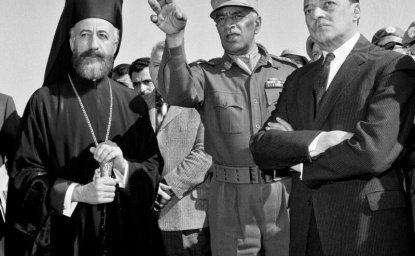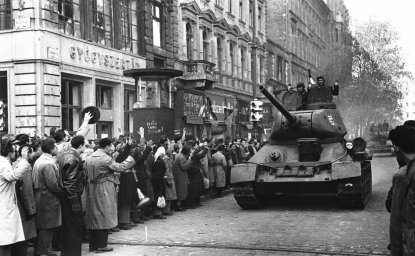Report on the Summer Institute on Conducting Archival Research
By Sutayut Osornprasop (Cambridge University)
Like many other Ph.D. students conducting research on the Cold War I often find my life somewhat academically lonely. Most of the time we have to work, conduct research and find research methods and strategies on our own. If we are lucky, our research strategies may work well and yield good results. If not, we may end up wasting several months or more. It is not very often that we get the opportunity to discuss our research with our supervisors, and our departments tend not to consider whether we need any skills or training in conducting Cold War research or not. Since there is only a handful of students who pursue research in the field, there are few occasions when we can fully engage in intellectual talks, discussions and opinion sharing in the subject of our research.
However, I am probably one of the luckier students. One cold but sunny afternoon in late February, my supervisor kindly informed me of a very interesting Cold War archival research workshop to be held at George Washington University (GWU), in Washington, D.C. He strongly encouraged me to attend this workshop – the Summer Institute on Conducting Archival Research (SICAR). He suggested that SICAR would provide very good training in archival research regarding the Cold War, and would be a perfect opportunity for me to meet fellow students from around the world who pursue research in similar fields. This sounded extremely exciting and I wasted no time in applying for SICAR and in making preparations for the trip.
March, April and May passed in the blink of an eye. And, in the afternoon of 3 June, I found myself standing in front of the Elliott School of International Affairs in Washington, D.C. I took the opportunity to visit the nice and cozy office of the Institute for European, Russian and Eurasian Studies, the main organizer of SICAR. There, I was warmly greeted by Professor James Goldgeier and his wonderful assistants, Jennifer Sieck and Vedrana Hadzialic. Afterwards, I had a short walk to the accommodation arranged for SICAR's participants at GWU's Hall on Virginia Avenue (HOVA). I found the accommodation comfortable and ideal for getting together with fellow participants (since the organizers were very kind to put all of us on the same floor).
In the morning we had breakfast together at the Elliott School of International Affairs. It was the first time I have ever had bagels for breakfast, and I found them tasty! I also found having bagels for breakfast very handy since we could walk around the room with a bagel in one hand, a glass of water in another, and introduce ourselves to fellow participants! After half an hour of breakfast, we proceeded to the conference room where we were introduced to all the SICAR participants. This was followed by an interesting presentation by Thomas Blanton and William Burr from the National Security Archive on "Preparing to visit an archive." I was amazed to learn about the National Security Archive, among the most prominent non-governmental research institutions in the US. The day after SICAR finished, I and a fellow SICAR participant Toshihiko Aono could not miss the opportunity to visit the National Security Archive. We were very impressed with the great initiative and efforts of the founders of the National Security Archive and with the people who keep it in perfect operation. It is indeed a great contribution to the public at large.
The second session, on "At the archives: Procedures for getting what you want, Part 1," started at 10:45 a.m. Our instructors were Marty McGann and Michael Hussey from the US National Archives (USNA). They provided us with guidance and valuable tips for when we conduct our research at USNA. We learned about Record Group 59 (RG 59) and the differences between central files, lot files and post files. Many of the SICAR participants, including myself, conducted some research at the USNA after the end of the Summer Institute, and we found that the advice and suggestions given to us by M. McGann and Mr. Hussey greatly facilitated our research.
After three hours of concentration and learning, we were impressed that lunch was nicely prepared for us. The organizers arranged the program very efficiently so that while we had lunch, we also had a chance to listen to David Geyer from the State Department giving a talk on the Foreign Relations of the Untied States (FRUS) series. Here we got to know how the historians in the State Department work on FRUS, what the criteria are for the selection of documents to be published in FRUS series and so on.
The next session, "How archivists think," was given by CWIHP Senior fellow and former Acting Archivist of the United States Trudy Peterson, currently working at the World Bank. She provided us with a very strong foundation in archival research and records management. It was in this session that we learned much more about how the archives and records are handled by governments and archivists. This is the basic, indispensable knowledge which is sometimes ignored by researchers.
Afterwards, GWU faculty James Goldgeier and Hope Harrison, in the session "Understanding where documents come from, how they come to be written, and the policymaker's perspective," shared with us their fascinating personal experiences of working in the White House/ US government. We learnt the very important roles of note takers and simultaneous interpreters, which may have a considerable influence on the records of conversations/meetings. The sharing of their experiences was very valuable indeed.
Later, we were introduced to foreign archives by Hope Harrison and GWU faculty member and former CWIHP director James Hershberg. Since many of SICAR participants were not from the United States, we joked that foreign archives, to many of us, could be the USNA and other American archives! Well, foreign archives in this circumstance means non-US archives. In this session, Harrison and Hershberg gave us an elaborate accounts of their experiences in conducting research mainly at archives in the former Soviet Union and East Germany. It was surprising to learn that many important records, which are still classified in the Soviet Union, are declassified in several archives in Eastern European countries and Germany! For example, a large number of communication records between Vietnam and the Soviet Union were carbon copied to the Soviet Union's satellites in Eastern Europe. These records may still be classified in the Soviet Union and Vietnam, but they are declassified in Germany in Eastern European countries. This was such a good news! Furthermore, we learned how to conduct research at foreign archives and were given several good tips on cultural issues, how the bureaucracy works, how to develop personal ties, etc.
Then we had a grand dinner together. The food was superb. During dinner, CWIHP director Christian Ostermann and Hershberg talked about the origins and the work of CWIHP. The work of CWIHP indeed impressed all of us. How great that we are invited to become part of the CWIHP family! I am sure that with the help of all SICAR participants, the work of CWIHP will progress much more rapidly and we could make a good contribution to the world of knowledge.
On the next day, 5 June, Harrison, Blanton, National Security Archive deputy director Malcolm Byrne and Hershberg led the first session on "Hands on: your chance to read and interpret documents and engage in a debate about them." It was "exercise" time! Documents on several issues on the Cold War from various sources were distributed to all participants. We got the opportunity to use the skills and knowledge we learnt on the first day of our program to interpret these documents and discuss them with each other. It was a big challenge and we learnt a lot from this exercise.
After a good brain workout, we had a big lunch, followed by a talk given by Dennis Ross, Director of Washington Institute for Near East Policy. He provided an interesting account on the perspective of policy makers from the State Department. Then Peter Kornbluh (National Security Archive) gave us good information about Freedom of Information Act (FOIA) requests. Gregg Brazinsky (GWU) widened the scope of our research with the introduction of non-governmental archives and private papers, which could be a very important and useful source of information for our research. We learnt that, in some areas of research, files of missionaries or philanthropic organizations/foundations could be even more important than governmental archives.
In the last session, James Goldgeier, Thomas Blanton and Hope Harrison talked about conducting interviews, and gave tips as well as do's and don'ts for our future interviews. Finally, we had a good and productive concluding discussion. SICAR was a big success! All of us were very glad to be presented with a grand certificate for the successful completion of SICAR. However, it was sad to leave... to tell ourselves that this was the end of the Summer Institute and we had to say good-bye to our friends. But, though all of us had to return to the places where we belong, SICAR created a big family and a valuable network of researchers on the Cold War. Even though we study in different places, none of us is going to be academically isolated anymore for we now know those who have the same research interests and who are ready to help, share, discuss ideas and help solve problems together.
I would like to take this opportunity to express my gratitude to George Washington University Cold War Group/ Institute for European, Russian and Eurasian Studies, CWIHP, the National Security Archive and all people concerned, for superbly hosting and sponsoring this great and beneficial Summer Institute. SICAR is a great initiative. It gave the first ever training on Cold War archival research to all participants, which helped us acquire necessary skills and techniques for our research. My sincere thanks also go to all fellow participants whose roles and contribution were vital to the success of SICAR and to the formation of our lasting network. Lastly but most importantly, I am very grateful to my supervisor, Dr. Jonathan Haslam, who kindly introduced SICAR to me and whose strong support enabled me to be part this great event.




